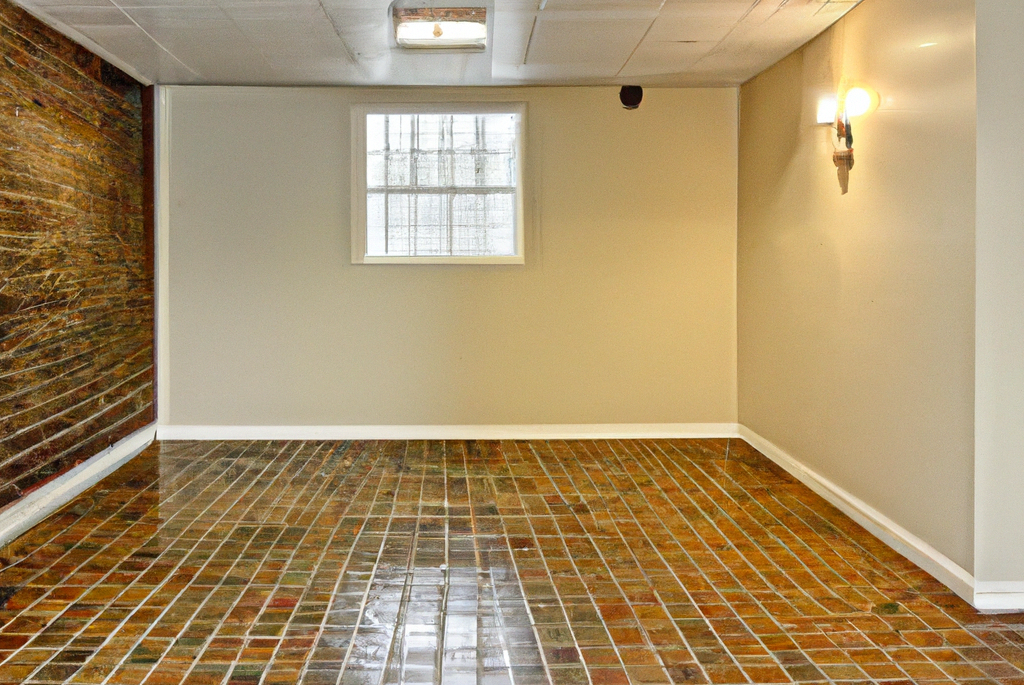
31 Jan What Are Basement Floor Options?
Before even considering what floor options are best for your basement, one needs to be sure their basement is properly waterproofed, sealed and safe to create a livable space worth flooring. This will help to protect your furnishings and belongings from moisture damage, mold, and mildew.
There are a number of basement waterproofing products on the market, so it’s important to do your own research to find the best solution for your needs. In addition, it is highly suggested and always best to hire a professional contractor to do the job.
In addition to waterproofing the basement, you’ll also need to make sure that any cracks or gaps in the walls and floor are sealed. Every spring, my grandfather would have to deep clean, seal, and waterproof their leaky basement all by himself; back then, that’s what they did. They never asked for help! Hmm, maybe why that basement still floods to this day. In fact, my cousin who lives there still has yet to hire a pro to do the job. I digress.
It is a fact that hiring professionals will help to prevent possible basement flooding and further damage to the space. And by taking these precautions, you can ensure that your basement is protected from water damage and ready for the flooring to be installed.
Types of basement flooring
Basement flooring options are an important consideration when finishing a basement or renovating the space. There are several different materials to choose from, each with its unique set of pros and cons for basement use. Here’s a list of the ten most popular basement flooring options:
- Luxury vinyl tile: Luxury vinyl tile (LVT) is a durable and water-resistant flooring option suitable for basements. It is available in a wide range of colors and styles and can be installed in various patterns.
- Engineered wood: Engineered wood is a type of wood flooring made of layers of real wood that are bonded together. It is more stable and less prone to warping than solid wood, making it a good choice for use in basements.
- Concrete: Concrete is a durable and low-maintenance flooring option that is suitable for use in basements. It can be left in its natural state or stained or polished to create a more finished look.
- Rubber: Rubber flooring is a durable and water-resistant option that is suitable for use in basements. It is available in various colors and styles and is easy to clean and maintain.
- Cork: Cork is a natural and eco-friendly flooring option that is suitable for use in basements. It is soft and comfortable underfoot, and it is available in a variety of colors and styles.
- Marble: Marble is a durable and elegant flooring option that is suitable for use in basements. It is available in a wide range of colors and styles and is easy to clean and maintain.
- Carpet tiles: Carpet tiles are an alternative to traditional carpet that is suitable for use in basements. They are easy to install and replace and are available in a wide range of colors as well as styles.
- Ceramic tile: Ceramic tile is a durable and water-resistant flooring option suitable for basements. It is easy to clean and maintain and is available in a wide range of colors and styles.
- Laminate: Laminate is a durable and moisture-resistant flooring option that is available in a wide range of colors and styles. It is easy to install and relatively inexpensive, making it a popular choice for basements.
- Linoleum: Linoleum is a durable and eco-friendly flooring option that is suitable for use in basements. It is available in a wide range of colors and styles, and it is easy to clean and maintain.
What type of flooring is best over concrete?
To sum it up – carpet, engineered hardwood, laminate, or vinyl flooring are all great options to install over a concrete substrate that can last for years when properly maintained (i.e., hire pros!).
In my home, my basement flooring is concrete, covered by indoor/outdoor carpeting. I have several throw rugs to warm up the space a bit, as well as to add some more “soft” walking space. I have back and knee issues, so walking on hard surfaces is painful for me. Luckily, the throw rugs add a nice design factor also!
Best basement flooring
Let’s go a little deeper into the basement flooring options like carpet, tile, and laminate:
Carpet is soft, warm, and comfortable to walk on, and it can help to reduce noise and improve the acoustics of a basement. However, carpet can be difficult to maintain in a damp or humid basement, as it can become moldy or musty over time. Carpet is also not the best choice for basements with high foot traffic or heavy furniture, as it can wear out more quickly in these situations.
The tile is durable, water-resistant, and easy to clean, making it a good choice for basements that may be prone to moisture. However, tile can be cold and hard underfoot, and it can be expensive to install. It is also important to ensure that the substrate, or surface beneath the tile, is properly prepared and leveled before installation, as any imperfections will be visible through the tile.
Laminate is durable, easy to install, and relatively inexpensive compared to other options. It is also resistant to moisture, making it a good choice for basements that may be prone to dampness. However, laminate is not as durable as other options, and it may be inclined to scratching or denting with heavy use. It is also important to make sure that the laminate is properly acclimated to the basement environment before installation, as extreme temperature changes can cause the laminate to expand or contract.
What are basement floor options?
In conclusion, it is important to ensure that a basement is waterproofed, sealed, and safe before installing flooring in the basement space. There are various options available for basement flooring. By taking the above-suggested precautions, homeowners can protect their belongings and furnishings from moisture damage, mold, and mildew, to create a comfortable and livable space in their basement.
Good luck, friends!


No Comments